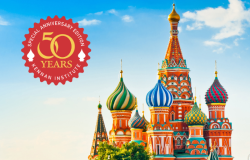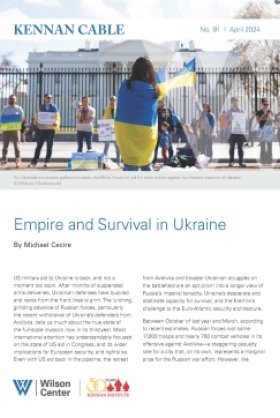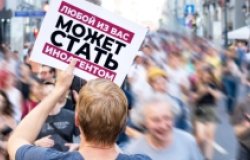Putin and the Russian Tradition: Illiberal but Democratic?
Hugh Ragsdale, independent scholar; Paul Stephan, Lewis F. Powell, Jr. Professor of Law, University of Virginia; Allen Lynch, Professor, Department of Politics, University of Virginia; Jack Matlock, Sol Linowitz Professor of International Relations, Hamilton College, and former U.S. Ambassador to the USSR
Overview
At a recent Kennan Institute talk, Hugh Ragsdale, independent scholar; Paul Stephan, Lewis F. Powell, Jr. Professor of Law, University of Virginia; Allen Lynch, Professor, Department of Politics, University of Virginia; and Jack Matlock, Sol Linowitz Professor of International Relations, Hamilton College, and former U.S. Ambassador to the USSR, discussed recent U.S. characterization of Russia as an undemocratic country. While the speakers acknowledged that President Vladimir Putin had instituted a number of illiberal policies, they argued that he is a democratically elected leader and that his policies reflect the real wishes of the majority of the Russian people. Criticizing Putin hurts U.S. national interest and is unlikely to influence Russia, they contended.
Hugh Ragsdale argued that Russia has a viable tradition of democracy, but no tradition of liberalism. Russia's current government corresponds to the preferences of many Russians for authoritarianism and populism over liberalism. Putin's government does not conform to the American ideal of liberal democracy, but, according to Ragsdale, Putin's policies do not threaten U.S. interests. Instead, in his view, Putin is a potential U.S. ally who has been alienated by aggressive American policies, such as support for the colored revolutions in three post-Soviet states and NATO expansion, and by harsh criticism of Russian domestic and foreign policy. The United States, Ragsdale contended, has replaced the Soviet Union as the supporter of worldwide ideological revolutions, and is hurting its own interests by doing so.
Allen Lynch noted that, historically, good U.S.-Russian and U.S.-Soviet relations have not been predicated on Russia's democratic credentials. Relations between the two states tend to be strong when neither attempts to be intimately involved in the policies of the other and both focus on pragmatic, shared interests. He gave WWII as an example of successful cooperation based on a shared goal. Relations between the U.S. and Russia have broken down, according to Lynch, when they become excessively intimate. In the early 1990s, he said, the United States became too closely involved in the process of political and economic reform in Russia, and by doing so engendered a major wave of anti-American sentiment and the strained U.S.-Russian relations that exist today.
Paul Stephan elaborated on the legacy of U.S. involvement in Russia during the early 1990s. He argued that the U.S. sided with Boris Yeltsin rather than with the Russian people, and developed programs based on false assumptions about the Russia's political and economic systems. Because of this ill-fated intervention, many Russians came to believe that American intentions toward Russia are malevolent and that the goal of U.S. democracy-promotion efforts is to weaken Russia. In this hostile environment, Stephan said, the U.S. has little ability to exert any influence on Russia.
Jack Matlock argued that the United States tends to hold Russia to idealistic standards of democracy and liberalism that no other country is expected to meet. The political and economic systems of the USSR were deeply flawed, he said, and it is unrealistic to expect Russia to have become a mature, liberal democracy in 15 years. Also problematic, according to Matlock, is the fact that U.S. leaders have recently been criticizing Russia for its lack of democracy and respect for human rights, while ignoring similar situations in other countries such as China. Because of this double standard, Matlock contended, it is not surprising that many Russians see U.S. criticism as hypocritical and self-serving. A more productive approach, he argued, would be for U.S. officials to bring up concerns about democracy and human rights in private meetings with Russian officials.
Hosted By

Kennan Institute
The Kennan Institute is the premier US center for advanced research on Eurasia and the oldest and largest regional program at the Woodrow Wilson International Center for Scholars. The Kennan Institute is committed to improving American understanding of Russia, Ukraine, Central Asia, the South Caucasus, and the surrounding region though research and exchange. Read more
Thank you for your interest in this event. Please send any feedback or questions to our Events staff.










